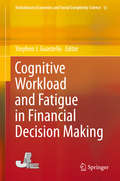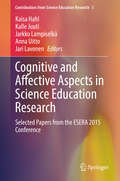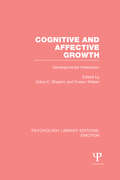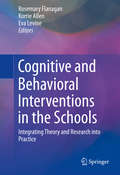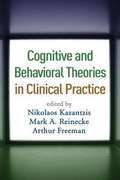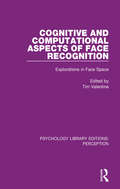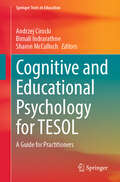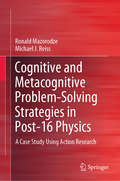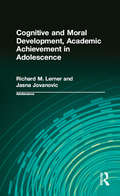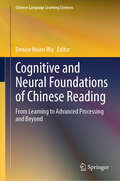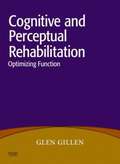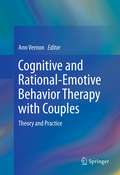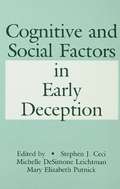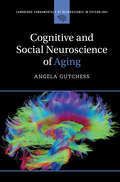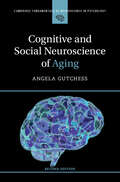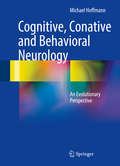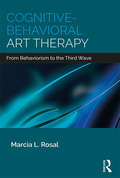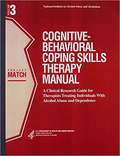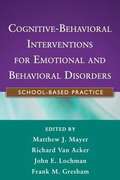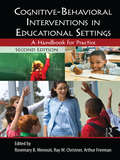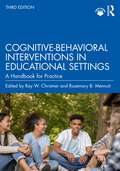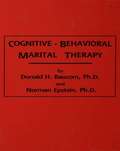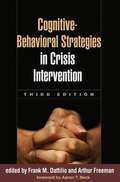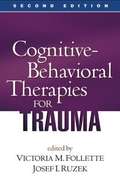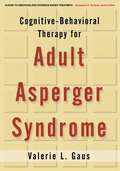- Table View
- List View
Cognitive Workload and Fatigue in Financial Decision Making (Evolutionary Economics and Social Complexity Science #13)
by Stephen J. GuastelloThis book presents new theory and empirical studies on the roles of cognitive workload and fatigue on repeated financial decisions. The mathematical models that are developed here utilize two cusp catastrophe functions for discontinuous changes in performance and integrate objective measures of workload, subjective experiences, and individual differences among the decision makers. Additional nonlinear dynamical processes are examined with regard to persistence and antipersistence in decisions, entropy, further explanations of overall performance, and the identification of risk-optimization profiles for long sequences of decisions.
Cognitive and Affective Aspects in Science Education Research: Selected Papers from the ESERA 2015 Conference (Contributions from Science Education Research #3)
by Kaisa Hahl Kalle Juuti Jarkko Lampiselkä Anna Uitto Jari LavonenThis edited volume brings forth intriguing, novel and innovative research in the field of science education. The chapters in the book deal with a wide variety of topics and research approaches, conducted in various contexts and settings, all adding a strong contribution to knowledge on science teaching and learning. The book is comprised of selected high-quality studies that were presented at the 11th European Science Education Research Association (ESERA) Conference, held in Helsinki, Finland from 31 August to 4 September, 2015. The ESERA science education research community consists of professionals with diverse disciplinary backgrounds from natural sciences to social sciences. This diversity provides a rich understanding of cognitive and affective aspects of science teaching and learning in this volume. The studies in this book will invoke discussion and ignite further interest in finding new ways of doing and researching science education for the future and looking for international partners for both science education and science education research. The twenty-five chapters showcase current orientations of research in science education and are of interest to science teachers, teacher educators and science education researchers around the world with a commitment to evidence-based and forward-looking science teaching and learning.
Cognitive and Affective Growth: Developmental Interaction (Psychology Library Editions: Emotion)
by Shapiro Edna Evelyn WeberOriginally published in 1981, this title is a collection of chapters based on papers presented at a conference called to explore what the editors called a developmental–interaction point of view – an approach to developmental psychology and education that stresses these interactive and reciprocal relations. The contributors, although from diverse professional backgrounds, are united in their commitment to an integrative view of developmental phenomena, one that highlights relationships among different aspects of development and the reciprocal nature of relations between people and their environments.
Cognitive and Behavioral Interventions in the Schools: Integrating Theory and Research into Practice
by Rosemary Flanagan Korrie Allen Eva LevineThis book offers a new framework for providing psychological services in schools at the individual, group, and systemic levels. It examines a variety of disorders common to school children, including anxiety, depression, ADHD, and conduct disorder, and outlines treatment options from evidence-based cognitive and cognitive-behavioral methods. The accessible real-world guidelines enable readers to design, implement, and evaluate interventions relevant to diverse student needs. Ethical, competency, and training concerns facing school practitioners in the new therapeutic environment are reviewed as well. Featured areas of coverage include: Behavioral assessment in school settings. PTSD and secondary trauma in children and adolescents. Transdiagnostic behavioral therapy for anxiety and depression in school. CBT for children with autism spectrum and other developmental disorders. Implementation, technological, and professional issues. The Practitioner's Toolkit: evidence-based cognitive and behavioral interventions. Cognitive and Behavioral Interventions in the Schools is an essential resource for professionals and scientist-practitioners in child and school psychology, social work, behavioral therapy, psychotherapy and counseling, and educational psychology.
Cognitive and Behavioral Theories in Clinical Practice
by Mark Reinecke Nikolaos KazantzisDemonstrating the importance of theory for effective clinical practice, this thought-provoking volume brings together leading experts on a range of contemporary cognitive and behavioral approaches. The contributors probe the philosophical and theoretical underpinnings of each model its assumptions about normal psychological processes, the development and maintenance of psychopathology, and the mechanisms by which therapeutic changes take place. The historical antecedents of the theories are examined and studies that have tested them are reviewed. Vivid case studies show practitioners how theory informs clinical decision making and technique in each of the respective approaches.
Cognitive and Computational Aspects of Face Recognition: Explorations in Face Space (Psychology Library Editions: Perception #29)
by Tim ValentineHow can computers recognize faces? Why are caricatures of famous faces so easily recognized? Originally published in 1995, much of the previous research on face recognition had been phenomena driven. Recent empirical work together with the application of computational, mathematical and statistical techniques have provided new ways of conceptualizing the information available in faces. These advances have led researchers to suggest that many phenomena can be explained by the structure of the information available in the population(s) of faces. This broad approach has drawn together a number of apparently disparate phenomena with a common theoretical basis, including cross-race recognition; the distinctiveness of faces; the production and recognition of caricatures; and the determinants of facial attractiveness. This title provides a state of the art review of the field at the time in which the authors use a wide variety of approaches. What is common to all is that the authors base the accounts of the phenomena they study or their model of face recognition on the statistics of the information available in the population of faces. On publication this title was a comprehensive, up-to-date review of an important area of research in face recognition written by active researchers. It includes contributions from mathematics, computer science and neural network theory as well as psychology. It is aimed at research workers and postgraduate students and will be of interest to cognitive psychologists and computer scientists interested in face recognition. It will also be of interest to those working on neural network models of visual recognition, perceptual development, expertise in visual cognition as well as facial attractiveness and caricature.
Cognitive and Educational Psychology for TESOL: A Guide for Practitioners (Springer Texts in Education)
by Sharon McCulloch Andrzej Cirocki Bimali IndrarathneThis volume has been written specifically with TESOL teacher educators, practitioners, and classrooms in mind. It is divided into three sections: cognitive aspects of language learning, individual differences, and language learning difficulties and challenging behaviours. Structured in this way, it enables TESOL teacher educators and practitioners to better understand how language learners process and retain new information, improving their overall ability to learn and remember. In addition to supporting TESOL teacher educators and practitioners in promoting effective language learning, this volume explains individual differences among language learners and the importance of developing learners’ emotional, social, and behavioural skills while addressing learning difficulties, disorders, disabilities, and challenging behaviours whenever required. The individual chapters are written in an accessible style to enable readers to explore various psychological concepts in their pedagogical practice by engaging in reflective teaching through action research. This volume is a vital resource for pre- and in-service language teachers and will encourage language teacher educators to reassess their existing practices.
Cognitive and Metacognitive Problem-Solving Strategies in Post-16 Physics: A Case Study Using Action Research (SpringerBriefs in Education)
by Michael J. Reiss Ronald MazorodzeThis book reports on a study on physics problem solving in real classrooms situations.Problem solving plays a pivotal role in the physics curriculum at all levels. However, physics students’ performance in problem solving all too often remains limited to basic routine problems, with evidence of poor performance in solving problems that go beyond equation retrieval and substitution. Adopting an action research methodology, the study bridges the `research-practical divide´ by explicitly teaching physics problem-solving strategies through collaborative group problem-solving sessions embedded within the curriculum. Data were collected using external assessments and video recordings of individual and collaborative group problem-solving sessions by 16-18 year-olds. The analysis revealed a positive shift in the students’ problem-solving patterns, both at group and individual level. Students demonstrated a deliberate, well-planned deployment of the taught strategies. The marked positive shifts in collaborative competences, cognitive competences, metacognitive processing and increased self-efficacy are positively correlated with attainment in problem solving in physics. However, this shift proved to be due to different mechanisms triggered in the different students.
Cognitive and Moral Development, Academic Achievement in Adolescence (Adolescence #2)
by Richard M. Lerner Jasna JovanovicThis volume focuses on concepts central to the understanding of the key features of individuality which undergo significant transformations throughout the adolescent period: Personality, self, and ego. While rooted in distinct theoretical traditions, these three concepts, in combination, capture the core aspects of the formation of the individual's unique sense of self or identity, a psychosocial development fundamentally associated with adolescence. Consistent with the developmental-systems models of person-context relations at the forefront of current human development theory and research, the articles within this volume focus on the dynamic, reciprocal relations between youth and key socializing agents within their ecologies. Nevertheless, the articles represented in this volume illustrate that when attempting to understand the development of personality- and self-systems, scholars differ in the extent to which they place primary emphasis on the individual, on the context, or on the relationship between the two.
Cognitive and Neural Foundations of Chinese Reading: From Learning to Advanced Processing and Beyond (Chinese Language Learning Sciences)
by Denise Hsien WuThis book provides a comprehensive and concise introduction of experiments on contemporary issues of language processing and the brain. It covers a wide range of neurolinguistic and neuroscience topics, including but not limited to word recognition, reading acquisition and dyslexia (in typically developed children, foreign language learners, and deaf people), comprehension of sentences and fictional narratives, the interplay of language processing/acquisition with other cognitive domains, and aging of language comprehension and Chinese reading. This book showcases the significance of empirical studies on language and cognitive processing, particularly those emerging from the Taiwan research community, to illuminate the intricate nature of the language faculty enabled by the sophisticated computations of the brain. This book informs readers of crucial issues in the neurolinguistic literature and advances in neuroimaging technology and provides perspectives inspired by evolution and neuroscience.
Cognitive and Perceptual Rehabilitation: Optimizing Function
by Glen GillenReflecting current practice with a renewed focus on function-based assessments and evidence-based interventions, Cognitive and Perceptual Rehabilitation: Optimizing Function includes all of the tools you need to make a positive impact on your patients’ lives. This clinical resource summarizes, highlights, and constructively critiques the state of cognitive and perceptual rehabilitation. This text helps you enhance your patients’ quality of life by promoting improved performance of necessary and meaningful activities, and decreasing participation restrictions.
Cognitive and Rational-Emotive Behavior Therapy with Couples: Theory and Practice
by Ann VernonThe book addresses the problems that couples experience through the life cycle. Each chapter includes an up-to-date review of the literature pertinent to the topic, with a focus on practical interventions which are generally based upon, but not limited to, cognitive and rational emotive behavioral principles. Case studies or vignettes further illustrate application of principles. Worksheets, checklists, or other resources that would be useful in working with couples are also included where relevant. This book presents interventions based upon research, theory, and most of all on practice. And is relevant to marriage and family therapists, mental health counselors, psychologists and psychiatrists, nurse practitioners, family law experts, social workers and relationship coaches. In addition, it can serve as a textbook for students in marriage and family therapy.
Cognitive and Social Factors in Early Deception
by Stephen J. Ceci Michelle DeSimone Leichtman Maribeth PutnickThe understanding of early deception is important for both theoretical and practical purposes. Children's deceptive behaviors provide a window into their models and theories of mind. On a practical level, childhood deception poses challenges for the legal system as well as parents and schools. In this volume, contributors from diverse areas of psychology -- social, cognitive, and developmental -- as well as philosophy and law examine the determinants of deception among preschoolers. In addition to a wealth of new empirical findings dealing with gender, motivation, and context in children's use of deception, evidence is provided for recursivity of awareness in children as young as three years of age. With chapters and commentaries written by leading scholars in the United States, England, and Australia, this book reflects a growing concern with ecological validity in developmental studies and may prompt rethinking of traditional models of mind based exclusively on data from laboratory experiments.
Cognitive and Social Neuroscience of Aging (Cambridge Fundamentals of Neuroscience in Psychology)
by Angela GutchessCognitive and Social Neuroscience of Aging is an introduction to how aging affects the brain, intended for audiences with some knowledge of psychology, aging, or neuroscience. The book includes figures illustrating brain regions so that extensive familiarity with neuroanatomy is not a pre-requisite. The depth of coverage also makes this book appropriate for those with considerable knowledge about aging. This book adopts an integrative perspective, including topics such as memory, cognition, cognitive training, emotion, and social processes. Topics include consideration of individual differences and the impact of disorders (e.g. Alzheimer's disease) on brain function with age. Although many declines occur with age, cognitive neuroscience research reveals plasticity and adaptation in the brain as a function of normal aging. This book is written with this perspective in mind, emphasizing the ways in which neuroscience methods have enriched and changed thinking about aging.
Cognitive and Social Neuroscience of Aging (Cambridge Fundamentals of Neuroscience in Psychology)
by Angela GutchessFully updated and revised, Cognitive and Social Neuroscience of Aging, 2nd Edition provides an accessible introduction to aging and the brain. Now with full color throughout, it includes over fifty figures illustrating key research findings and anatomical diagrams. Adopting an integrative perspective across domains of psychological function, this edition features expanded coverage of multivariate methods, moral judgments, cognitive reserve, prospective memory, event boundaries, and individual differences related to aging, including sex, race, and culture. Although many declines occur with age, cognitive neuroscience research reveals plasticity and adaptation in the brain as a normal function of aging. With this perspective in mind, the book emphasizes the ways in which neuroscience methods have enriched and changed thinking about aging.
Cognitive, Conative and Behavioral Neurology: An Evolutionary Perspective
by Michael HoffmannThis ground breaking title presents the many different neurologic syndromes and vastly expanding data in the brain sciences from an evolutionary, or neuro-archeological, perspective, as well as a clinical one. The neuro-archeological perspective offers a more thorough picture of the field - providing hindsight that leads to great insight and foresight. It thus provides the reader with the core foundational aspects of many perplexing neurologic syndromes. Authored by a noted authority in cognitive neurology and including ample tables, diagrams and images, the book covers the full range of behavioral neurological, psychological and neuropsychiatric syndromes, as well as their underlying disease states, relevant neuropsychological tests and contemporary neuroimaging, both structural and functional. The evolutionary approach offers a comprehensive, novel, and completely updated overview of each topic. An invaluable title unlike any other in the field, Cognitive, Conative and Behavioral Neurology: An Evolutionary Perspective is a landmark resource and will be of great interest to neurologists, psychiatrists, neuroscientists, and trainees in all fields.
Cognitive-Behavioral Art Therapy: From Behaviorism to the Third Wave
by Marcia L. RosalCognitive Behavioral Art Therapy explores the intersection of art therapy practices and principles within cognitive-behavioral therapy (CBT) theories and models. This timely new resource examines CBT theory as it relates to art therapy, and offers an argument for the inclusion of CBT within art therapy-based treatments. An analysis of the historical roots of both CBT and cognitive behavioral art therapy (CBAT) is presented along with current practices and a proposed model of implementation. Also included are case studies to enhance this in-depth exploration of a largely unexamined perspective within the arts therapies.
Cognitive-Behavioral Coping Skills Therapy Manual: A Clinical Research Guide For Therapists Treating Individuals With Alcohol Abuse And Dependence
by Ronald KaddenThis study is the first national, multi-site trial of patient-treatment matching. Describes cognitive-behavioral coping skills therapy (CBT), one type of treatment approach. Core Sessions include coping with cravings and urges to drink; problem solving; drink refusal skills, and more. Elective Sessions include starting conversations; introduction to assertiveness; anger management; job-seeking skills, and much more. Bibliography.
Cognitive-Behavioral Interventions for Emotional and Behavioral Disorders
by Matthew Mayer Richard Van AckerEvidence based and practical, this book presents state-of-the-science approaches for helping K-12 students who struggle with aggressive behaviors, anxiety, depression, ADHD, and autism. It explains the fundamentals of cognitive-behavioral intervention and reviews exemplary programs that offer powerful ways to reach at-risk children and adolescents. Leading authorities thoroughly describe the process of assessment, treatment planning, implementation, and program evaluation. What makes the book unique is its focus on the nitty-gritty of school-based intervention, including how to integrate mental health services into the special education system, overcome obstacles, and provide needed skills to school personnel.
Cognitive-Behavioral Interventions in Educational Settings: A Handbook for Practice
by Arthur Freeman Ray W. Christner Rosemary B. MennutiSchools and school staff play a critical role in the cognitive, behavioral, emotional, social, and interpersonal development of children and adolescents. This second edition of Cognitive-Behavioral Interventions in Educational Settings teaches readers to think strategically about the individual and plan for effective and specific interventions based on the student’s age, developmental level, and presenting problems. It is written by forward-thinking, established professionals whose writing represents the state-of-the-art in cognitive behavioral interventions in educational settings, and presents evidence-based interventions for a variety of issues commonly seen in schools. Including both innovative and well-established approaches, they offer assessment methods and interventions for a variety of issues and concerns faced by school-aged youth. The use of case studies and session outlines, as well as the balance of theoretical and clinical concerns, enhances this book’s value as a reference for both clinicians and students. New to this edition are topics on cyber-bullying, parent and school consultation, school-wide positive behavioral support, and bipolar disorder. This is the ideal reference for those who wish to select and utilize precise interventions in school settings.
Cognitive-Behavioral Interventions in Educational Settings: A Handbook for Practice
by Ray W. Christner Rosemary B. MennutiThe thoroughly updated third edition of Cognitive-Behavioral Interventions in Educational Settings offers readers a way to think strategically about individual students and plan for effective interventions based on the student’s age, developmental level, and presenting problem.Written in a forward-thinking manner, this volume presents evidence-based interventions and offers both innovative and well-established approaches to working with children and adolescents in a school setting. The book begins by establishing foundational skills that provide updated information on CBT and a framework for working with youth and addresses timely issues such as schoolwide approaches to intervention, brief care models, ethnicity and race, and wellness programs. The second part of this volume uses CBT to explore strategies for building relationships, assessment, intervention, progress monitoring, and more. Case studies and specific techniques are provided throughout each chapter.Cognitive-Behavioral Interventions in Educational Settings provides a complete overview for effective practice using CBT in schools.
Cognitive-Behavioral Marital Therapy (Brunner/mazel Cognitive Therapy Ser.)
by Norman Epstein Donald H. BaucomThe current volume by Baucom and Epstein demonstrates the product that can result when two individuals, both of whom are skilled therapists, creative theoreticians and experienced researchers, combine their efforts. No other two individuals have the depth of understanding and the breadth of knowledge needed to write a book of his magnitude on cognitive behavioral therapy of marital distress. As a result, the best of the scientist-practitioner is revealed in Cognitive-Behavioral Marital Therapy.
Cognitive-Behavioral Strategies in Crisis Intervention, Third Edition
by Frank Dattilio Arthur FreemanThis invaluable practitioner guide and text shows how cognitive-behavioral interventions can help people weather situations of extreme stress and build needed skills for the future. Leading authorities describe effective, time-efficient approaches to managing different types of crises those related to particular psychological problems, such as panic disorder, suicidal depression, and personality disorders; medical crises; child and family crises; and environmental and situational crises, including large-scale traumatic events. Vivid case material illustrates what the interventions look like in action and how to tailor them to individual clients' needs. New to This Edition Incorporates new empirical data and clinical innovations. Chapters addressing clinical decision making, treating law enforcement personnel, traumatic stress syndromes, and applications for working with chronic pain sufferers, aggressive youths, and victims of terrorism.
Cognitive-Behavioral Therapies for Trauma, Second Edition
by Josef Ruzek Victoria FolletteThis volume presents cutting-edge cognitive and behavioral applications for understanding and treating trauma-related problems in virtually any clinical setting. Leading scientist-practitioners succinctly review the "whys," "whats," and "hows" of their respective approaches. Encompassing individual, group, couple, and parent-child treatments, the volume goes beyond the traditionally identified diagnosis of PTSD to include strategies for addressing comorbid substance abuse, traumatic revictimization, complicated grief, acute stress disorder, and more. It also offers crucial guidance on assessment, case conceptualization, and treatment planning.
Cognitive-Behavioral Therapy for Adult Asperger Syndrome
by Valerie Gaus Gary MesibovAn invaluable resource for therapists, this lucidly written book provides research-based strategies for addressing the core problems of Asperger syndrome (AS) and helping clients manage frequently encountered comorbidities, such as anxiety disorders and depression. Detailed case examples illustrate the complexities of AS and the challenges it presents in daily life, relationships, and the workplace. The author presents a cogent rationale for cognitive-behavioral intervention and offers clear guidelines for conducting assessments and designing and implementing individualized treatment plans. Throughout, the emphasis is on helping people with AS decrease distress while preserving and building on their unique strengths. Special features include a case formulation worksheet and other helpful reproducibles.
